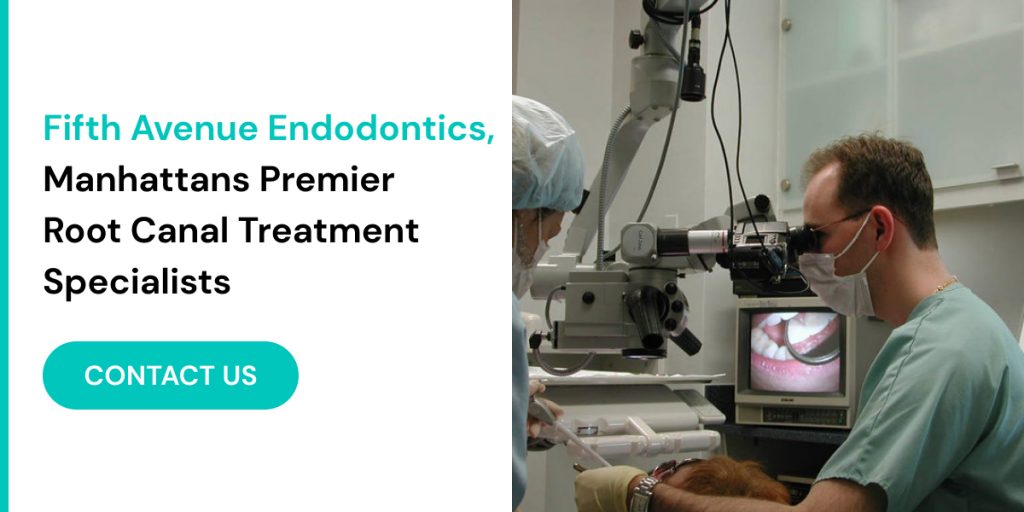Introduction
Endodontics, often synonymous with root canal treatment, is a crucial field within dentistry that addresses issues deep within the tooth. This specialty focuses on the dental pulp and tissues surrounding the roots, dealing with infections and inflammations that, if left untreated, can lead to severe pain, abscesses, and even systemic health issues. For residents of the bustling city, finding a reliable specialist in New York endodontics is paramount. The fast-paced lifestyle of New York means that many people might overlook the importance of addressing dental issues promptly, yet doing so is vital for maintaining not just oral health, but overall systemic health as well. At Fifth Avenue Endodontic, Dr. Iofin and his team are dedicated to providing expert care. They ensure that oral infections are treated promptly and effectively, using the latest technology and techniques to manage even the most complex cases. This commitment to excellence helps safeguard the broader health of their patients, making them a trusted choice for endodontic care in New York.
Understanding Endodontics
Endodontics is a specialized branch of dentistry that delves into the complexities of the dental pulp and the tissues surrounding the roots of a tooth. This field is pivotal in addressing issues that go beyond the surface of the tooth, focusing on the internal health that is crucial for overall dental stability and functionality.
The dental pulp, located in the center of the tooth, is a soft tissue comprising nerves, blood vessels, and connective tissue. When this pulp becomes inflamed or infected, typically due to deep decay, repeated dental procedures, or trauma, it can lead to severe pain and potential tooth loss if not treated promptly. Common symptoms of pulp damage include prolonged sensitivity to hot or cold, discoloration of the tooth, and swelling or tenderness in the nearby gums.
Endodontic treatment, often referred to as root canal therapy, is necessary to save the affected tooth and prevent further complications. The process involves several critical steps:
- Diagnosis: A thorough examination using radiographs (X-rays) and other diagnostic tools to determine the extent of the pulp damage.
- Accessing the Pulp Chamber: The dentist creates an opening in the crown of the tooth to reach the pulp chamber and root canals.
- Cleaning and Disinfecting: The infected or inflamed pulp is carefully removed. The interior of the tooth is then cleaned and disinfected to eliminate bacteria and prevent further infection.
- Filling and Sealing: The cleaned canals are filled with a biocompatible material, usually gutta-percha, and sealed to prevent reinfection.
- Restoration: The tooth is then restored with a crown or filling to protect it and restore its full function.
Endodontic treatment is essential not only for alleviating pain and saving natural teeth but also for preventing the spread of infection to other parts of the body. Untreated pulp infections can lead to abscesses, which are pockets of pus that form at the root of the tooth and can cause severe health issues if the bacteria enter the bloodstream.
For residents in Manhattan seeking New York endodontics, it’s reassuring to know that specialists like Dr. Iofin at Fifth Avenue Endodontics are equipped with advanced technology and expertise to perform these intricate procedures effectively. Their dedication ensures that each patient receives comprehensive care aimed at preserving dental health and preventing systemic complications.
The Link Between Oral and Systemic Health
Increasingly, research has highlighted a significant connection between oral health and overall systemic health. The mouth is a gateway to the rest of the body, and poor oral health can have far-reaching effects beyond the mouth. Endodontic infections, if left untreated, can exacerbate or contribute to systemic conditions. Understanding these connections is crucial for maintaining both oral and overall health. Here’s a closer look at how systemic conditions are linked to endodontic health:
Cardiovascular Disease
Numerous studies have suggested a strong correlation between periodontal disease and cardiovascular conditions such as heart disease and stroke. Chronic inflammation and infections, including those from untreated root canals, can contribute to the development of atherosclerosis (narrowing of the arteries) and other cardiovascular issues. Here’s how:
- Bacterial Pathway: The bacteria from oral infections can enter the bloodstream through small cuts or lesions in the gums. Once in the bloodstream, these bacteria can attach to fatty deposits in the arteries, contributing to plaque formation and atherosclerosis. This can lead to blockages that cause heart attacks and strokes.
- Inflammatory Response: Chronic oral infections trigger a systemic inflammatory response. Inflammation is a known risk factor for cardiovascular disease as it can cause damage to blood vessels, increasing the risk of heart disease and stroke.
- Endocarditis: Endodontic infections can also lead to infective endocarditis, a serious condition where the inner lining of the heart chambers and valves becomes infected. This occurs when bacteria from the mouth enter the bloodstream and attach to damaged areas of the heart.
Given these risks, it is evident that maintaining good oral health is critical for heart health. Regular dental check-ups and prompt endodontic treatment can help mitigate these risks.
Diabetes
The relationship between diabetes and oral health is bidirectional. Patients with diabetes are more susceptible to infections due to their compromised immune systems. Conversely, severe oral infections, such as those requiring endodontic treatment, can exacerbate diabetes by affecting blood sugar control. Here’s a detailed look at this interplay:
- Immune Response: Diabetes impairs the body’s ability to fight infections. High blood sugar levels can lead to dry mouth, reducing saliva production and increasing the risk of oral infections. Once an infection sets in, the body’s response is slower and less effective.
- Blood Sugar Control: Oral infections can create a state of chronic inflammation, which can interfere with insulin sensitivity and glucose metabolism. This makes it more difficult for diabetic patients to control their blood sugar levels, creating a vicious cycle of poor health outcomes.
- Periodontal Disease: Periodontal disease is more severe and prevalent in diabetic patients. The inflammation associated with periodontal disease can worsen insulin resistance, further complicating diabetes management.
Maintaining excellent oral health is essential for diabetic patients to manage their condition effectively. Regular dental visits, good oral hygiene practices, and timely endodontic treatment are crucial components of diabetes management.
Respiratory Infections
Oral bacteria can be aspirated into the lungs, leading to respiratory infections such as pneumonia. This is particularly concerning for elderly individuals and those with chronic lung conditions. Here’s how endodontic infections can contribute to respiratory complications:
- Aspiration: Bacteria from the mouth can be inhaled into the lungs, especially during sleep. This is more likely to occur in individuals with poor oral hygiene or untreated dental infections. Once in the lungs, these bacteria can cause infections such as pneumonia.
- Chronic Conditions: For individuals with chronic respiratory conditions such as chronic obstructive pulmonary disease (COPD), the presence of oral bacteria can exacerbate their condition. The inflammation caused by these bacteria can worsen respiratory symptoms and lead to more frequent and severe exacerbations.
- Hospital-Acquired Infections: In hospitalized patients, especially those on ventilators, the risk of aspirating oral bacteria increases. Good oral care is essential to reduce the risk of hospital-acquired respiratory infections.
Addressing endodontic infections promptly can reduce the bacterial load in the mouth, thereby decreasing the risk of respiratory infections.

Osteoporosis
Osteoporosis is a condition characterized by weakened bones, making them more prone to fractures. There is a potential link between osteoporosis and oral health, particularly concerning the jawbone and dental health. Here’s how osteoporosis and endodontic health are connected:
- Jawbone Health: Osteoporosis can lead to the loss of bone density in the jaw, which can result in tooth loss. The jawbone supports the teeth, and its weakening can make the teeth more susceptible to loosening and falling out. This can create a need for endodontic treatment or other dental interventions.
- Medication Side Effects: Bisphosphonates, a class of drugs commonly prescribed to treat osteoporosis, can have side effects that impact oral health. These medications can cause osteonecrosis of the jaw, a condition where the jawbone starts to die due to a lack of blood flow. This underscores the importance of managing oral infections promptly to avoid complications.
- Oral Health Maintenance: People with osteoporosis need to be particularly vigilant about their oral health. Regular dental check-ups and timely treatment of dental issues are crucial to maintaining oral health and preventing tooth loss.
Maintaining good oral health and addressing endodontic issues promptly can help mitigate the impacts of osteoporosis on dental health.
Holistic Approach to Health
The interconnectedness of oral and systemic health emphasizes the importance of a holistic approach to healthcare. Here are some key points to consider:
- Preventive Care: Regular dental check-ups and cleanings are vital for preventing oral health issues that could have systemic effects. Preventive care can identify and address problems before they become serious, reducing the risk of systemic complications.
- Early Intervention: Prompt treatment of dental issues, particularly endodontic infections, is crucial. Early intervention can prevent the spread of infection and mitigate the impact on overall health.
- Education and Awareness: Educating patients about the link between oral health and systemic health is essential. Awareness can motivate individuals to prioritize their oral health and seek timely treatment for dental issues.
- Collaborative Care: Healthcare providers, including dentists, endodontists, and primary care physicians, should collaborate to ensure comprehensive care. Sharing information and coordinating treatment plans can lead to better health outcomes for patients.
The link between oral and systemic health is clear and compelling. Endodontic infections, if left untreated, can contribute to serious systemic conditions such as cardiovascular disease, diabetes, respiratory infections, and complications related to osteoporosis. For residents in Manhattan seeking expert care in New York endodontics, specialists like Dr. Iofin at Fifth Avenue Endodontics are dedicated to providing comprehensive treatment that not only addresses oral health but also safeguards overall health.
Maintaining regular dental check-ups, practicing good oral hygiene, and seeking prompt endodontic treatment are essential steps in promoting both oral and systemic health. By understanding and addressing the connection between systemic health and endodontics, we can take significant strides toward improving overall well-being. Remember, your oral health is a vital part of your general health, and taking care of it should be a priority for everyone.
The Role of Endodontics in Maintaining Systemic Health
Given the intricate connections between oral and systemic health, endodontics plays a pivotal role in safeguarding overall well-being. Here’s how:
Prevention and Early Intervention
Regular dental check-ups and early intervention in cases of dental pulp inflammation or infection are vital. Identifying and treating issues early can prevent the spread of infection and its potential systemic effects. Fifth Avenue Endodontics emphasizes the importance of timely treatment to prevent complications.
Comprehensive Treatment
Endodontic treatment, often referred to as root canal therapy, involves removing the infected pulp, cleaning and disinfecting the root canal system, and then sealing it to prevent further infection. This not only saves the tooth but also eliminates a source of infection that could affect systemic health. Dr. Iofin’s expertise ensures that the treatment is performed with precision, reducing the risk of re-infection and promoting optimal recovery.
Education and Awareness
Educating patients about the link between oral infections and systemic health is crucial. Patients should be made aware of the importance of maintaining good oral hygiene and seeking prompt treatment for dental issues. Dr. Iofin and his team at Fifth Avenue Endodontics are committed to raising awareness about these connections and guiding patients towards better health outcomes.
Key Takeaways
Understanding the connection between systemic health and endodontics highlights the importance of addressing dental infections promptly and effectively. Here are some key takeaways:
- Oral Health and Heart Health: Untreated oral infections can contribute to cardiovascular problems. Maintaining good oral hygiene and seeking timely endodontic care can reduce this risk.
- Diabetes Management: Diabetic patients must be particularly vigilant about their oral health, as infections can affect blood sugar control.
- Respiratory Health: Oral bacteria can impact respiratory health, making it essential to manage dental infections to prevent complications like pneumonia.
- Bone Health: Osteoporosis and oral health are interconnected, and managing oral infections can help preserve bone health.

Conclusion
The intricate relationship between systemic health and endodontics underscores the need for specialized care when dealing with dental infections. In Manhattan, New York endodontics specialists like those at Fifth Avenue Endodontics, led by Dr. Iofin, are dedicated to providing the highest standard of care. By addressing endodontic issues promptly, patients can not only save their teeth but also safeguard their overall health.
Maintaining regular dental check-ups, practicing good oral hygiene, and seeking timely treatment for dental issues are crucial steps in promoting both oral and systemic health. For expert endodontic care, residents of New York can rely on Fifth Avenue Endodontics to provide the necessary treatment and guidance for a healthier future.
By understanding and addressing the connection between systemic health and endodontics, we can take significant steps toward improving overall well-being. Remember, your oral health is a vital part of your general health, and taking care of it should be a priority for everyone.

